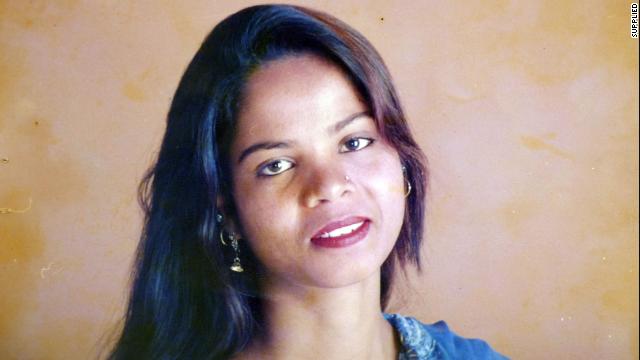
[ad_1]
The workers had refused to drink from a bucket of water Asia Bibi had touched because she was not Muslim. At the time, Asia Bibi said the case was a matter of women who didn’t like her “taking revenge.”
She won her appeal against the conviction and subsequent death sentence on Wednesday.
David Curry, CEO of Open Doors USA, an organization that lobbies on behalf of Christian minorities, said in a statement that “we are breathing a sigh of relief today.”
“These charges stemmed from her Christian identity as well as false accusations against her,” he said. “We are hopeful that Pakistan will now take additional steps to offer religious freedom and basic human rights throughout the country.”
Controversial law
Her case has attracted widespread outrage and support from Christians worldwide, and condemnation from conservative Islamist groups in Pakistan, who have demanded the death penalty be carried out and threatened widespread protests in the event of her being freed.
Islamist movement Tehreek-e Labbaik had previously vowed to take to the streets if Bibi was released.
The case has been extremely divisive within Pakistani society, splitting liberals and conservatives and leaving even many supporters afraid to speak out on Asia Bibi’s behalf.
In 2011, senior politician Salman Taseer was shot dead by his own bodyguard for voicing support for Asia Bibi and condemning the country’s stringent blasphemy laws. His killer, Mumtaz Qadri, immediately surrendered to police and was later executed, becoming a martyr for many hardline Islamists.
At his funeral in 2016, thousands converged on the northern city of Rawalpindi as the Pakistani media was blacked out to prevent riots. Leaders of prominent Islamist political parties attended the funeral as supporters of Qadri carried signs in celebration of his “bravery.”
Qadri’s grave, in the capital city of Islamabad, has since become a shrine for those supporting Asia Bibi’s death sentence.
Polarizing case
Amnesty International researcher Rabia Mehmood said that one of the reasons the Asia Bibi case has become so polarizing and controversial is the Pakistani government’s failure to take “effective measures to curb the campaign of hate and violence incited by certain groups in the country following her conviction, in fact the state has shown immense tolerance for the narratives of hate.”
In May this year, Pakistan’s Interior Minister, Ahsan Iqbal, was shot and wounded in his shoulder in an incident police sources linked to the 2017 demonstrations.
“We can only hope that (the Asia Bibi case) becomes a watershed moment when it comes to blasphemy laws in Pakistan,” Mehmood said.
A verdict in Asia Bibi’s favor, sends “out a message of hope and will be a step in addressing human rights abuses, religiously motivated discrimination and violence targeted at religious minorities and even Muslims who are accused of committing blasphemy.”
CNN understands that at least two Western countries have offered Asia Bibi asylum once she has been released. Such a move will likely be greeted by mass protests by Islamist groups, which could turn violent.
“Instead of snubbing the international community, one that Islamists see as impinging on Pakistan’s move toward a full theocracy, Khan could emphasize the need to embrace it and to work with it. In other words, Khan could choose to stand with the innocent woman instead of the rabid and bloodthirsty extremists.”
Religious battle
Outside of Pakistan, Asia Bibi’s case has become a rallying call for many Christians, particularly Catholics.
Catholic charity Aid to the Church in Need (ACN) led prayers for Asia Bibi’s release last week in the UK, at a ceremony attended by her husband Ashiq Masih and daughter, Eisham Ashiq.
In her 2012 book “Get Me Out of Here,” Asia Bibi included a letter to her family urging them not to “lose courage or faith in Jesus Christ.”
Sophia Saifi reported from Pakistan. James Griffiths reported from Hong Kong.
[ad_2]Source link
